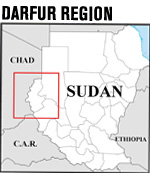Technorati Tags: pediatrician or obesity and pediatrics or Medical and Latina or children and body weight or preschool and Psychology or overweight
Mothers often have inaccurate perceptions of their children's body weight, study shows
Latina mothers of preschool-aged children frequently have inaccurate perceptions of their children's body mass index and believe they are healthy when they are overweight, according to a new study from the University of California, San Francisco.
"A significant number of women believed that their children were normal weight when they were, in fact, overweight," said lead study author Elena Fuentes-Afflick, MD, MPH, UCSF associate professor of pediatrics and a pediatrician at San Francisco General Hospital. "However, if the mother described her child as overweight, she was usually correct, but it is concerning that many mothers did not perceive their overweight children as being overweight."
The study findings were presented at the Pediatric Academic Societies annual meeting today (April 29) in San Francisco. Fuentes-Afflick said the study has implications for the effort to stem the tide of pediatric obesity, which has reached epidemic proportions in the United States.
"It's not just Latino parents. As a pediatrician, when you start to talk to parents about their child's weight or body mass, you have to ask: How much and what are children eating? How much TV are they watching? It's especially challenging to talk about these issues with respect to young children because parents are largely responsible for their children's dietary habits.
"If there is a mismatch between what the pediatrician and the mother think is a healthy weight, how do we, as pediatricians, clearly and effectively communicate information about the child's weight to the mother and other family members?" Fuentes-Afflick said.
The study analyzed data from patient interviews conducted for the Latino Health Project, a prospective study of Latina women who were recruited during pregnancy and interviewed annually. The study included 194 women and children who were interviewed in 2000-03, three years after recruitment.
The number of overweight children was higher among women who perceived their children had good or excellent health status, among women who had no concerns about their children's health status, and among women who reported their children eat well.
Overweight children were defined as those with weights at or above 85th percentile on developmental growth charts, adjusted for their age and height.
"As a society, we have a number of negative labels that we use to describe overweight people, and parents don't want their child to fall into that category. It often takes several visits to the pediatrician, communicating the same message before parents understand that overweight is an important issue for children," Fuentes-Afflick said.
The number of overweight children was significantly less likely among women who perceived their children had fair or poor health status and whose weight was perceived as too low, according to study findings. ###
The study is co-authored by Nancy A. Hessol, MSPH, assistant professor, division of infectious diseases, UCSF Department of Medicine.
The study was supported by grants from the National Institute for Child Health and Human Development and the Robert Wood Johnson Foundation.
UCSF is a leading university that consistently defines health care worldwide by conducting biomedical
Contact: Phyllis Brown pbrown@pubaff.ucsf.edu 415-476-2557 University of California - San Francisco
Related: Keyword biology, Sunday, April 16, 2006 Other people influence us and we don't even know it!, Tuesday, January 04, 2005 The Cassini-Huygens mission to Saturn, Sunday, March 20, 2005 Agriculture Secretary Mike Johanns, bovine spongiform encephalopathy (BSE), Thursday, March 24, 2005 Fish Oil Holds Promise in Alzheimer's Fight, Sunday, April 10, 2005 National Human Genome Research Institute (NHGRI), Friday, April 15, 2005 Study uncovers bacteria's worst enemy , Sunday, May 01, 2005 Yes, it is an exoplanet 2M1207 system, Friday, May 20, 2005 a polysaccharide called hyaluronan, Tuesday, May 24, 2005 pseudoneglect phenomenon, Friday, June 03, 2005 DOE JGI sequences DNA from extinct cave bear, Monday, June 06, 2005 From a Few Wild Ancestors, a Citrus Cornucopia, Tuesday, June 07, 2005 NHGRI Selects 13 More Organisms for Genome Sequencing, Sunday, July 24, 2005 Prehistoric Native Americans maize cultivation , Sunday, July 31, 2005 Protein 97 Synapse-associated (SAP97), Sunday, August 07, 2005 universal flu vaccine, Sunday, August 07, 2005 Smoking gun for Alzheimer's disease, Sunday, August 07, 2005 placental tissue, embryonic stem cells, Sunday, August 21, 2005 female senior faculty are still rare, Sunday, September 18, 2005 more rain would benefit New Orleans,












